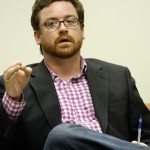Christopher A. Bail is an Assistant Professor of Sociology at the University of North Carolina, Chapel Hill.
He studies how non-profit organizations and other political actors create cultural change by analyzing large groups of texts from newspapers, television, public opinion surveys, and social media sites such as Facebook and Twitter. He is the author of Terrified: How Anti-Muslim Fringe Organizations Became Mainstream (Princeton University Press, 2015). His articles have been published by American Sociological Review, Sociological Methods & Research, and Theory and Society. His work has also been recognized by awards from the American Sociological Association, the Society for the Scientific Study of Religion, and the Society for Study of Social Problems, and supported by the National Science Foundation and the Robert Wood Johnson Foundation. Bail earned his Ph.D. from Harvard University in 2011 and served as a Robert Wood Johnson Scholar at the University of Michigan before joining the faculty at the University of North Carolina, Chapel Hill. Beginning in July, 2015 he will be an Assistant Professor of Sociology at Duke University, and an affiliate of the Duke Network Analysis Center and the Duke Information Initiative on Big Data.
Jennifer C. Lena is an Associate Professor of Arts Administration, Teachers College, Columbia University and holds a courtesy appointment in the Department of Sociology.
She is also Senior Research Scholar for the Strategic National Arts Alumni Project (SNAAP) at Indiana University. She is a past fellow of the Center for Arts and Cultural Policy Studies at Princeton University, and the Curb Center for Arts, Enterprise, and Public Policy at Vanderbilt University, and held faculty positions at Vanderbilt University and Barnard College. Her research focuses on understanding processes of classification, particularly the organizational and institutional conditions for the creation, modification, or elimination of cultural categories like genres. She is the author of Banding Together: How Communities Create Genres in Popular Music (Princeton University Press, 2012), which was named one of Choice Reviews Outstanding Academic Titles for 2012; the paperback edition was published in November 2014. Her current projects include a study of the increasingly broad and diverse tastes of U.S. elites, provisionally titled, Slumming: The Reproduction of Prestige, which will be published by Princeton University Press. Her research has been published in the American Sociological Review, Social Forces, Poetics, and American Behavioral Scientist, among other peer-reviewed journals, and has been reprinted in texts dedicated to highlighting excellence in social science methods, hip-hop scholarship, and the sociology of culture. Lena serves on the editorial boards of Sociology Compass, Poetics, and Contemporary Sociology. With Frederick F. Wherry and Greta Hsu, she is the co-editor of Culture and Economic Life, a book series published by Stanford University Press.
Omar Lizardo is an Associate Professor of Sociology at the University of Notre Dame, a fellow at the Kroc Institute for Peace Studies, and a member of the Interdisciplinary Center for Network Science and Applications.
His research deals with various topics in sociology, social psychology, cultural sociology, network theory, and cognitive science. These range from the role of institutional logics in social movement organizing (Larson and Lizardo 2014), the relationship between network theory and organizational theory (Lizardo and Pirkey 2014), the link between identity theory and the sociology of emotions (Lizardo and Collett 2013), the connection between cultural breadth and the activation of weak ties (Lizardo 2013), the relationship between macro-level institutional change and micro-level patterns of cultural taste (Lizardo and Fishman 2013), to the way in which conceptual metaphors related to dirt and cleanliness figure in moral reasoning (Lizardo 2012). His work has appeared in such venues as American Sociological Review, Theory and Society, Sociological Theory, and Social Forces. With Jessica Collett, he was the guest-editor of a recent (June 2014) special issue of Social Psychology Quarterly dedicated to advancing the connections between Social Psychology and Cultural Sociology. He is currently a member of the editorial advisory board of a several journals, including American Sociological Review, Social Forces, Theory and Society, Poetics, and Sociological Forum. He is the recipient of the 2013 Lewis Coser Award for Theoretical Agenda Setting from the American Sociological Association Section on Theory and the co-winner (with Robert Fishman) of the Charles Tilly best article award from the American Sociological Association’s section on Comparative Historical Sociology.
Terence E. McDonnell is an Assistant Professor of Sociology at the University of Notre Dame, and a fellow at the Kellogg Institute.
Terry is a cultural sociologist (Ph.D. 2009, Northwestern University) who studies the role of objects and media in everyday life. He explains why some cultural objects have the power to shape belief and behavior, while others fail to have the intended effect by tracing the production, circulation, and reception of objects over time. His present work theorizes this process of “cultural entropy:” how the intended meanings and uses of culture fracture into alternative meanings, new practices, failed interactions, and blatant disregard. His book, Best Laid Plans: Cultural Entropy and the Unraveling of AIDS Media Campaigns (forthcoming University of Chicago Press), develops this idea of cultural entropy to explain why HIV/AIDS media campaigns often fail to change peoples’ belief and behavior. Theorizing the materiality of objects is central to Terry’s work, as can be seen in two articles published in publications. “Cultural Objects as Objects: Materiality, Urban Space, and the Interpretation of AIDS Campaigns in Accra, Ghana” (The American Journal of Sociology 2010) won an honorable mention for the Geertz Prize in Cultural Sociology. More recently, he analyzed materiality and space in art exhibitions with Wendy Griswold and Gemma Mangione, titled “Objects Words, and Bodies in Space: Bringing Materiality into Cultural Analysis” (Qualitative Sociology 2014). Terry has additional interest in theorizing cultural resonance. This research appeared in the special issue of Theory and Society(2014) on Measuring Culture, titled “Drawing Out Culture: Productive Methods to Measure Cognition and Resonance.”
Ashley Mears is an Assistant Professor of Sociology at Boston University
I study the intersections of culture and markets. After receiving my B.A. in sociology from the University of Georgia in 2002, I went to graduate school at New York University for my Ph.D. in sociology and graduated in 2009. In my teaching and research, I explore generally how people assign value to things, and I focus on how gender, race, and class inequalities inform the production and change of culture. My first book, Pricing Beauty: The Making of a Fashion Model, examines the production of value in fashion modeling markets. Through ethnography and interviews, I traced the backstage work and collaboration behind the fashion “look” in modeling markets in New York and London. I discovered an organized production process that goes into producing something most people take for granted as a natural state: beauty. These production processes are structured along racial and gendered lines, such that markets in cultural production like fashion ultimately become sites for the reproduction of cultural inequalities. Building from this work, I have been researching the global context of culture and beauty, based on the case of the global fashion model scouting industry. As global gatekeepers, model scouts play a crucial role in identifying and promoting ideas of beauty around the world. Currently I’m working on a book project that examines how women produce status distinctions for men in the global VIP leisure and party scene. Based on multi-sited ethnographic observations over 18-months from New York to the French Riviera, I use the global circuit of VIP leisure scenes as a case to examine the values, roles, and repertoires of symbols that this segment of the elite uses to signal status to each other. This research fills gaps in knowledge on contemporary elites with rare ethnographic insights to analyze culture and stratification dynamics among the global “one percent,” and shows the uses of women’s bodies in men’s mobility projects to climb up elite hierarchies.
Ann Mische is an Associate Professor of Sociology and Peace Studies at the University of Notre Dame, and a fellow at the Kellogg Institute and Kroc Institute.
She received her Ph.D from the New School for Social Research in 1998 and taught at Rutgers University (1999-2013) prior to joining the Notre Dame faculty. Her work focuses on processes of communication, deliberation and leadership in social movements and democratic politics. Her book, Partisan Publics: Contention and Communication across Brazilian Youth Activist Networks (Princeton 2008), examines changes in the field of Brazilian youth politics during two decades of democratic reconstruction (1977-1997), focusing on the shifting relationship between partisan and civic engagement. The book won an Honorable Mention for the 2009 Best Book Award of the ASA Political Sociology Section. She is currently studying the role of future projections in contentious public deliberations, including an analysis of future-oriented environmental discourse during the 2012 United Nations Conference on Sustainable Development (Rio+20). Her articles on the Brazilian case have appeared in Poetics, theInternational Review of Social History, and several edited volumes, including Social Movements and Networks: Relational Approaches to Collective Action (Oxford 2003). She has also written broader theoretical articles on agency, culture, temporality, and social interaction, appearing in theAmerican Journal of sociology, the Annual Review of Sociology, Sociological Forum, Social Research, Theory and Society and the Sage Handbook of Social Network Analysis (2011). She has served as chair of two sections of the American Sociological Association: Political Sociology (2013-14) and Theory (2007-08).
John Mohr, (PhD, Yale, 1992) is a Professor of Sociology at University of California, with affiliated appointments in the Department of Communication and in the Technology Management Program in the College of Engineering at the University of California, Santa Barbara.
His primary interest is in the empirical study of meaning systems. His focus has been on developing applications of formal methods of relational (network) analysis to the study of discourse in institutional systems. He was originally trained as an organizational sociologist and his early work was concerned with the rise of bureaucratic forms of rationalization in the American social welfare sector (focusing in particular on Progressive Era New York City). Among other things, he has studied the effects of cultural capital on mobility, the institutional logics of student cultures, and the discourse logic of affirmative action policies in higher education. He is currently working on finding ways to use textual analysis tools from the computer sciences to analyze cultural systems and he is applying these tools to analyze rhetorical strategies in U.S. National Security Strategy discourse systems. In addition to a number of articles, essays and chapters, Mohr has edited a half dozen journal special issues (in Poetics and in Theory and Society) and with Roger Friedland, Mohr co-edited Matters of Culture: Cultural Sociology in Practice(Cambridge University Press, 2004). With Barbara Harthorn he co-edited The Social Life of Nanotechnology (Routledge, 2012). Mohr has been a visiting professor at the New School for Social Research in NY, at the University of Rome and at the Maison des Sciences de L’Homme in Paris. He has served as chair of the ASA Section on the Sociology of Culture and he is the incoming chair of the ASA Section on Theory. Mohr currently serves on the editorial boards of Sociological Theory, Theory and Society, Poetics and The American Journal of Cultural Sociology. Mohr is currently co-PI (and co-Director) of the NSF funded “Network Science and Big Data” IGERT PhD Training Program at UCSB.
Iddo Tavory is an Assistant Professor of Sociology at NYU.
His overarching interest is in the interactional patterns through which people come to construct and understand their lives. His book Abductive Analysis: Theorizing Qualitative Research (co-authored with Stefan Timmermans) outlines a pragmatist approach to the relation among theories, method, and observations in qualitative research (University of Chicago Press, 2014). His second book, Summoned, is an ethnography of an Orthodox Jewish neighborhood in Los Angeles, as well as an attempt to theorize the co-construction of identification, interaction and the patterning of social worlds (forthcoming, 2015, University of Chicago). His publications have appeared, among other places, in the AJS, ASR,Sociological Theory and Theory and Society.
Stephen B. Vaisey is Associate Professor of Sociology at Duke University.
His research focuses on where people get their ideas about what a “good life” looks like and what it means to be a “good person” and to determine how that shapes the choices they make. He has also conducted research on 1970s communes, religion and marijuana use, educational overqualification, gene-environment interactions, and the relationship between poverty and educational aspirations, among other topics. Most generally, he examines why people do the things they do, and figures out the role of culture and cognition in explaining human behavior. He earned a BA in French and a BS in Sociology from Brigham Young University and an MA and Ph.D in Sociology from the University of North Carolina at Chapel Hill.
Frederick F. Wherry is Professor of Sociology at Yale and Co-Director of the Center for Cultural Sociology.
He is currently studying how immigrant and minority households become more equitably integrated into the financial system. How do people lacking bank accounts become banked? What kinds of financial arrangements match well with existing household and community practices? He is also editing a four-volume Encyclopedia of Economics and Society (expected 2015). He has conducted ethnographic investigations of value generation in artisanal production, the use of arts and culture in neighborhood transformation, and place-based narrations of value in the global economy. He is the author of Global Markets and Local Crafts, The Philadelphia Barrio, and The Culture of Markets as well as co-editor (with Nina Bandelj) of The Cultural Wealth of Nations. He teaches courses on the sociology of markets, culture and globalization, and qualitative research design. He has worked in international development with the World Bank and has an MPA from the Woodrow Wilson School of Public and International Affairs and a PhD in Sociology from Princeton. He spent two years at the University of Pennsylvania on a Mellon Postdoctoral Fellowship before teaching at the University of Michigan and Columbia University. He serves on the editorial boards of American Sociological Review and The American Journal of Cultural Sociology. In 2012 he was elected to a three-year term on the Economic Sociology Council and in 2014 he was elected Chair of the Consumers and Consumption Section of the American Sociological Association. He serves on the policy board of the Journal of Consumer Research. He was recently elected into the membership of the Sociological Research Association. Outside of the university he serves on the Board of Trustees at Asheville School and has served on the boards of the Association of Princeton Graduate Alumni as well as the Latin American Cultural Roots (Raíces) nonprofit in Philadelphia.









